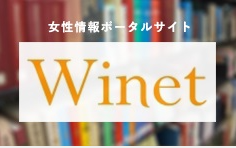Cooperation with JICA
- HOME
- International Cooperation
- Cooperation with JICA
- FY2023 Knowledge Co-creation Program "Promotion of Networking among ASEAN Countries on Anti-Trafficking in Persons”
Cooperation with JICA
- Event Report
-
FY2023 Knowledge Co-creation Program "Promotion of Networking among ASEAN Countries on Anti-Trafficking in Persons”
Date:October 18 to November 18, 2023
The National Women’s Education Center (NWEC) offered a seminar titled ”Promotion of Networking among ASEAN Countries on Anti-Trafficking in Persons” from October 18 to November 18, 2023 as a project commissioned by the Japan International Cooperation Agency (JICA).
Eight officials from government ministries, police agencies, and NGOs in charge of anti-trafficking in persons in five ASEAN countries (the Kingdom of Cambodia, the Lao People's Democratic Republic, Malaysia, the Kingdom of Thailand, and the Socialist Republic of Vietnam) participated in the seminar.
The seminar focused on the policies against trafficking in persons in the five participating countries and Japan, especially measures for prevention and protection. Participants learned about public and private initiatives and countermeasures and exchanged opinions.
First, through lectures and visits, the seminar participants learned about Japan’s public and private frameworks and initiatives based on the Action Plan to Combat Trafficking in Persons. They presented inception reports on the initiatives for anti-trafficking in persons taken in their respective countries, exchanged opinions on issues and differences, and shared good practices.
For the action plan presentation on the final day of the seminar, participants presented plans and concrete schedules executable by their job authorities regarding the eradication of trafficking in persons and the protection of victims from the perspective of persons involved.
Through the seminar, it was reconfirmed that the participating countries are committed to promoting cooperation among the ASEAN countries on anti-trafficking in persons.
1. Program Highlights
Online program before coming to Japan
On October 18, an online orientation was conducted via Zoom, and participants from each country presented an inception report on their affiliated organizations and job roles, as well as their expectations for this seminar.
In-Japan Program
November 8 (Wed) and 9 (Thu): Japanese Government’s Initiatives Related to Trafficking in Persons
After a program orientation, participants deepened their understanding about the Japanese government’s initiatives related to trafficking in persons through lectures by officials from the Cabinet Secretariat, the Immigration Services Agency, and the National Police Agency.
Through a visit to the Cabinet Secretariat, they learned about basic information on trafficking in persons in Japan, as well as the government’s measures against trafficking in persons.
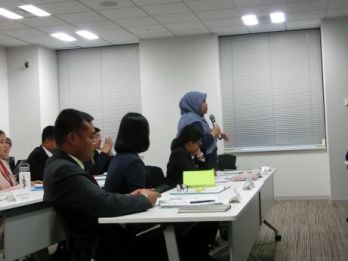 Participant asking questions at the Cabinet Secretariat
Participant asking questions at the Cabinet Secretariat
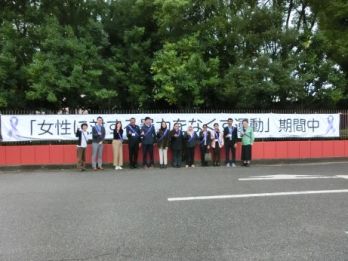 Group photo at NWEC
Group photo at NWEC
At the Immigration Services Agency, participants received a presentation on measures against trafficking in persons, including recent case examples of victim support, and toured the facility.
On the November 9, participants visited NWEC and received a welcome address from the president, followed by a lecture from a National Police Agency official on measures against trafficking in persons. Participants asked questions about specific methods of prosecution, including ways to crack down on online sexual crimes and child pornography. They also asked questions about potential cooperation with companies that operate social network platforms regarding the deletion of photos related to sex crimes and suspension of the accounts of offenders among other topics.
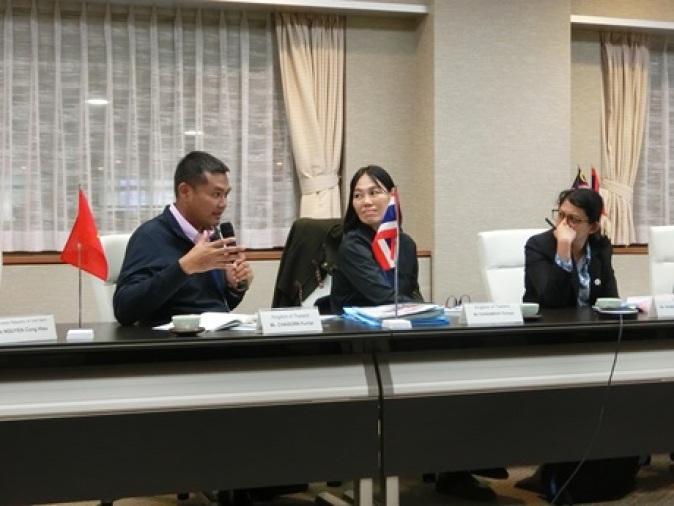 Participant asking questions
Participant asking questions
November 10 (Fri) to November 14 (Tue): Cooperation with International Organizations and Initiatives for Supporting Victims of Trafficking in Persons Taken by Private Sectors
Lecturers from the International Organization for Migration and a civil society organization gave talks on how to practice victim-centered approaches, comparing case works in the United States and in Japan. During the discussion session, participants and lecturers who work against trafficking in persons shared stories about their motivations to work in the anti- TIP field. They discussed their ongoing passion that keeps them invested in the work, and they empathized with each other’s experiences.
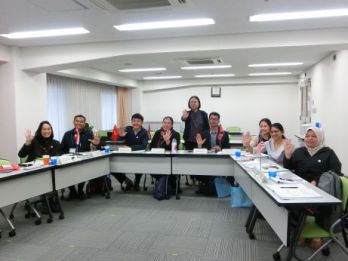 Group photo with the lecturer
Group photo with the lecturer
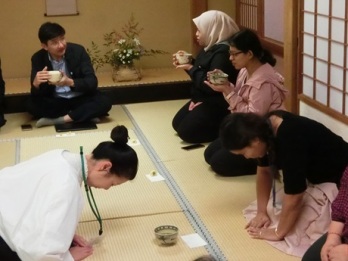 Experiencing Japanese culture (tea ceremony) in NWEC
Experiencing Japanese culture (tea ceremony) in NWEC
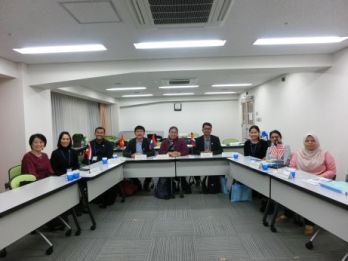 Group photo with the lecturer
Group photo with the lecturer
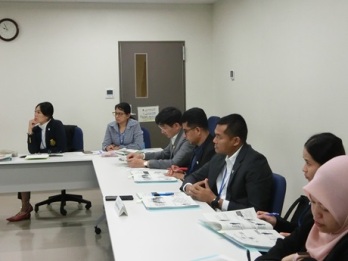 Participants listening intensely to a presentation on online sexual exploitation in Japan
Participants listening intensely to a presentation on online sexual exploitation in Japan
During a stay at NWEC, participants from each country presented a report which covered the current situation of the countermeasures taken against trafficking in persons in their countries. Participants talked passionately and exchanged opinions about the current situation of the measures taken against trafficking in persons in their respective countries.
From Specified Non-Profit Organization PAPS (Organization for Pornography And Sexual Exploitation Survivors), participants learned about efforts to support victims of online sexual exploitation. While gaining insight into ways to support victims through technology, participants discussed the importance of supporter’s self-care, and shared personal hardships and efforts to combat online sexual exploitation.
During a visit to the General Incorporated Association Social Inclusion Support Center, participants received a lecture, which included case examples, on hotline operation and accompanying support provided by private-sector organizations.
Participants took interest in the vigorous efforts the organization is making, such as setting up a social media consultation desk and offering multilingual support. They asked various questions covering topics such as counselor training and mental health care for staff workers.
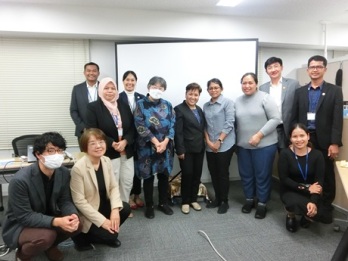 Group photo with the lecturers
Group photo with the lecturers
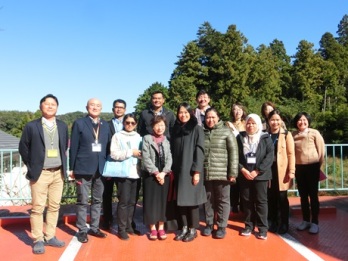 Group photo with the lecturers
Group photo with the lecturers
A lawyer involved in supporting victims of trafficking in persons gave a lecture on laws relating to trafficking in persons in Japan. The lecture included case examples of online sexual exploitation, and deepened participants' understanding about the legal framework and practical applications to crimes of trafficking in persons. During a tour to the Tokyo Metropolitan Women's Consultation Center, participants received a briefing on the operation of a public temporary shelter.
Participants also visited a private-sector organization in Chiba Prefecture that offers support services to foreigners, women and children who are victims of domestic violence. They toured a shelter where victims can stay for a medium-to-long term and received a briefing on the organization’s efforts to protect victims. Participants were moved that the organization's founder began their efforts with the hope of supporting both Japanese children and children from other parts of Asia. This contributed to the gradual expansion of the support network. Participants also admired the extensive facilities and thoughtful support services.
November 15 (Wed) to November 16 (Thu): Private Sector Initiatives for Supporting Migrant Foreign Workers
Facilitated by participants, the group looked back on Japan’s efforts to support victims of trafficking in persons, and compared these efforts with those made by other countries. It was a productive time for them to make meaningful connections between what they learned through the seminar and the efforts being made in their respective countries.
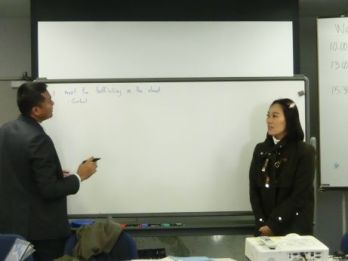 Participants looking back
Participants looking back
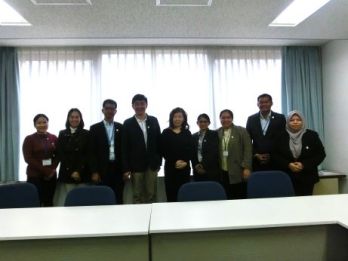 Group photo with the lecturer
Group photo with the lecturer
A lecturer from the Non-Profit Organization Japan Vietnam Tomoiki Association gave a lecture on issues and initiatives surrounding foreign workers and technical intern training program trainees in Japan. Participants asked questions about how the Japanese government is adapting, how the technical training system is being monitored, and what efforts the Organization for Technical Intern Training (OTIT) is making, among other topics. Participants were highly interested in this topic.
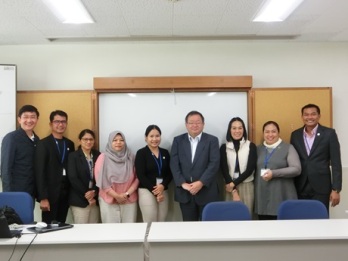 Group photo with the lecturer
Group photo with the lecturer
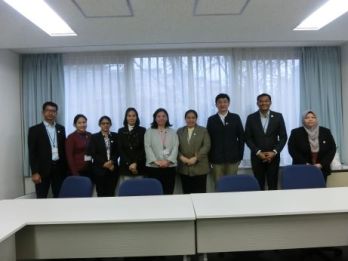 Group photo with the lecturer
Group photo with the lecturer
A lecturer from another NPO, Citizen's Network for Global Activities (CINGA), made a presentation on the intermediary support they provide to connect professionals, such as physicians and lawyers, with foreigners in Japan who need support. Participants working in shelters and on hotlines for victims asked questions about specific points to note and consider when offering mental support to people who consult them for help.
In order to achieve ethical and responsible acceptance of foreign workers, a lecturer from Japan Platform for Migrant Workers towards Responsible and Inclusive Society (JP-MIRAI) made a presentation on the consultation services that are a joint effort between private-sector organizations (comprised of Japanese businesses and economic groups) and public-sector organizations. The lecturer also discussed implementation of training and study sessions for accepting foreign workers, as well as the operation of platforms that provide information, offer networking support, and so on. Participants asked questions related to their own job duties, such as specific results of collaboration with government ministries and agencies.
November 17 (Fri): Action Plan Presentation and Evaluation Session
After provision of information from experts, participants presented action plans. In their action plans, they described the knowledge they gained through the seminar and the issues facing their countries. They presented specific plans and implementation schedules that considered their respective job duties. After receiving comments and support messages from the experts, JICA staff, and senior advisor on gender equality in attendance, a closing ceremony was held.
At the closing ceremony, a certificate of completion was awarded to each participant.
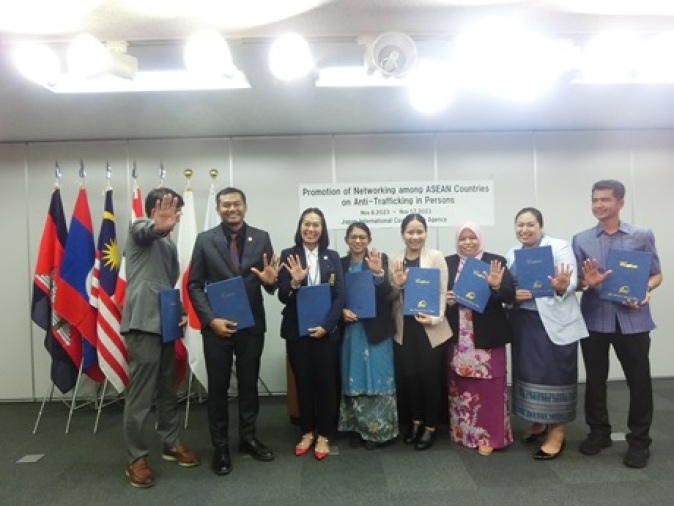 Participants posing “stop trafficking in persons” for a photo
Participants posing “stop trafficking in persons” for a photo
2. Comments from Participants
・The program was a wonderful opportunity of learning, and it was a good experience to learn about Japanese systems.
・I would like to propose a similar program regarding labor issues, there is something to be gained from programs like this (Knowledge Co-Creation Program).
・I found useful information in every presentation.
・It was exciting to learn that PAPS has been successful in their efforts to delete online images of sex crimes, and that they are making serious efforts to protect rights of consulters from online sexual exploitation.
・At the Social Welfare Council, we had an opportunity to see how women are effectively supported, and it was very informative.
・All of the training contents were useful, and I learned a lot from each lecture and model.
NWEC sincerely thanks all the individuals of the related ministries and agencies (the Cabinet Office, the Immigration Services Agency, and the National Police Agency), prefectures (Tokyo), an international organization, private-sector support groups, experts, and networks engaged in support activities, who offered a great deal of cooperation in setting up lectures, facilitating discussions, and visits for carrying out this seminar.
International Cooperation
- International Seminar
- FY2019 Seminar for Gender Equality Officers and Women Leaders in the Asia Region
- FY2018 Seminar for Gender Equality Officers and Women Leaders in the Asia Region
- FY2017 Seminar for Gender Equality Officers and Women Leaders in the Asia Region
- FY2016 Seminar for Gender Equality Officers and Women Leaders in the Asia Region
- FY2015 Seminar for Gender Equality Officers and Women Leaders in the Asia Pacific Region
- FY2014 Seminar for Gender Equality Officers and Women Leaders in the Asia Pacific Region
- FY2013 Seminar for Gender Equality Officers and Women Leaders in the Asia Pacific Region
- FY2012 Seminar for Gender Equality Officers and Women Leaders in the Asia Pacific Region
- FY2011 Seminar for Gender Equality Officer and Women Leaders in the Asia Pacific Region
- FY2010 Empowerment Seminar for Women Leaders in the Asia Pacific Region
- FY2009 Empowerment Seminar for Women Leaders in the Asia Pacific Region Final Report
- FY2008 Empowerment Seminar for Women Leaders in the Asia Pacific Region
- FY2007 Empowerment Seminar for Women Leaders in the Asia Pacific Region
- FY2006 Empowerment Seminar for Women Leaders in the Asia Pacific Region
- NWEC Global Seminar
- FY2025 NWEC Global Seminar: Addressing Technology-Facilitated Gender Based Violence (TFGBV): Approaches to Eradicate the Invisible Harm
- FY2024 NWEC Global Seminar: Gender Equality and Care
- FY2023 NWEC Global Seminar: Gender Mainstreaming & Strengthening Institutional Mechanism with Gender Perspective
- FY2022 NWEC Global Seminar: Does Digital Technology Advance Gender Equality?
- FY2021 NWEC Global Seminar: Combating Gender-Based Violence – “Building Back Better” from the Covid-19 Crisis
- FY2020 NWEC Global Seminar: Covid-19 and Gender
- FY2019 NWEC Global Seminar: Gender and Media
- FY2018 NWEC Global Seminar: Promotion of the Advancement of Women - What Japan can learn from Iceland about Gender Equality?
- FY2017 NWEC Global Seminar: Promotion for Advancement of Women Lessons from Germany
- FY2016 NWEC Global Seminar: Promotion for Advancement of Women –Lessons from Europe
- FY2015 International Symposium: Gender Equality and Women's Empowerment
- FY2014 International Symposium: Keys to Diversity and Women's Leadership
- FY2013 NWEC International Symposium:Gender Equality for Men
- FY2012 NWEC International Symposium:To Make a Society without Violence against Women a Reality
- FY2011 NWEC International Symposium
- FY2010 International Forum for Women's Empowerment
- FY2009 International Forum for Women's Empowerment
- FY2008 International Forum for Women's Empowerment Final Report3
- FY2008 International Forum for Women's Empowerment Final Report2
- FY2008 International Forum for Women's Empowerment Final Report1
- Cooperation with JICA
- FY2025 Knowledge Co-Creation Program (KCCP): "Promotion of Global Networking on Anti-Trafficking in Persons"
- FY2025 Knowledge Co-Creation Program "Eradicating Sexual and Gender-Based Violence (SGBV)"
- FY2025 Knowledge Co-Creation Program: Bangladesh “Strengthening Capacity to Address Gender-Based Violence"
- FY2024 Knowledge Co-Creation Program on "Promotion of Global Networking on Anti-Trafficking in Persons"
- FY2024 Knowledge Co-Creation Program "Eradicating Sexual and Gender-Based Violence (SGBV)"
- FY2023 Knowledge Co-creation Program "Promotion of Networking among ASEAN Countries on Anti-Trafficking in Persons”
- FY2023 Knowledge Co-Creation Program "Eradicating Sexual and Gender-Based Violence (SGBV)"
- FY2022 Knowledge Co-creation Program "Promotion of Networking among ASEAN Countries on Anti-Trafficking in Persons”
- FY2022 Knowledge Co-Creation Program "Eradicating Sexual and Gender-Based Violence (SGBV)"
- FY2021 Knowledge Co-creation Program "Promotion of Networking among ASEAN Countries on Anti-Trafficking in Persons”
- FY2020 Knowledge Co-creation Program "Promotion of Networking among ASEAN Countries on Anti-Trafficking in Persons”
- FY2019 Knowledge Co-creation Program "Promotion of Networking among ASEAN Countries on Anti-Trafficking in Persons”
- FY2018 Knowledge Co-creation Program "Promotion of Networking among ASEAN Countries on Anti-Trafficking in Persons”
- Issue-specific Training “Seminar on Promotiom of Networking among ASEAN Countries on Anti-Trafficking in Persons”
- Basic Information-Gathering Survey/Workshop Seminar on the Economic Independence for Women in Central America and the Caribbean (El Salvador/Dominican Republic)
- Regional Gender Seminar in Central and South America
- 2015 Issue-specific Training "Seminar on Promotion of Networking among Asian Countries on Anti-Trafficking in Persons"
- Seminar on the Promotion of Education for Girls and Women II
- International Conference/International Exchange
- Online meeting with Seisen International School elementary students
- Visitor: Mansfield Fellows
- Visitor:JICA Knowledge Co-Creation Program (KCCP) on "Women's Empowerment through Business for Central American Integration System (SICA) Member Countries"
- The 68th Session of the Commission on the Status of Women
- Visitor: Madam Sustjie Mbumba, First Lady of the Republic of Namibia
- Workshop of commemorating the donation of the Beate Shirota Gordon archive materials
- Meeting with Korean Women’s Development Institute (KWDI)
- The Coalition of Finnish Women's Associations (NYTKIS) Secretary General Ms. KAKKOLA’s Courtesy Call to Foreign Minister KAMIKAWA
- The Coalition of Finnish Women's Associations (NYTKIS) Secretary General Ms. KAKKOLA’s Japan Visit Program
- The 67th Session of the Commission on the Status of Women
- NGO CSW67 Forum
- Webinar with Korean Women’s Development Institute (KWDI)
- The 66th Session of the Commission on the Status of Women (Hybrid format)
- Online meeting with international graduate students from the Appropriate Technology course at the University of Tsukuba
- The 65th session of the Commission on the Status of Women
- Lecture "The Beate Sirota Gordon Archives at Mills College"
- Participation in 2nd AGenT
- The 64th session of the Commission on the Status of Women
- Dr. Wang from National Taiwan University visits NWEC
- Japan Network of Women Engineers and Scientists and The Japan Inter-Society Liaison Association Committee for Promoting Equal Participation of Men and Women in Science and Engineering: 9th Japan Korea China Women Leaders Forum for Science & Technology
- Researcher from the KWDI visits NWEC
- Visit by a delegation from the Socialist Republic of Vietnam Ministry of National Defense
- Briefing on the Reykjavik Index for Leadership
- Women's Archives Center Exhibition "Beate Sirota Gordon and gender equality in Japanese Constitution"
- Visit from the Guangxi Women’s Federation
- Participation in the 63rd Session of the Commission on the Status of Women
- 7th Global Forum on Gender Statistics
- FY2018 International Symposium hosted by Korean Institute for Gender Equality Promotion and Education “Gender Equality at Schools”
- Visit from All-China Women’s Federation(ACWF)
- Participation in the 62nd Session of the Commission on the Status of Women
- The 14th KIGEPE International Symposium “Empowering Women’s Leadership: expanding influence and innovation”
- Participation in the 61st Session of the Commission on the Status of Women
- Visit from the Batis Center for Women
- 2011 Asia Women Eco-Science Forum (a forum of science and engineering leaders in Japan, China and Korea)
- The 60th Session of the Commission on the Status of Women
- The 59th Session of the United Nations Commission on the Status of Women
- The 58th Commission on the Status of Women
- The 57th Session of the United Nations Commission on the Status of Women
- International Symposium: Gender Awareness Education for Sustainable Development
- Thirtieth Anniversary Programs
- Attendance at the Ceremony Commemorating the 25th Anniversary of the Korean Women’s Development Institute (KWDI)
- Japanese-Filipino children (JFC)* from the Philippines-based NGO “DAWN” visit the Center
- Visitors from Abroad to NWEC
- Research report on Multicultural Family Support in South Korea
- Workshop on Gender and Education: Life-long Learning for Women’s Empowerment
- Lecture Delivered by a Visiting Researcher
- Connections: Bringing Together the Next Generation of Women Leaders in Science, Technology, Engineering and Mathematics
- Conclusion of Memorandum of Understanding on Exchange and Cooperation with the Ministry of Women's Affairs, Royal Government of Cambodia
- Visit to Japan by the Minister of Women’s Affairs of the Royal Government of Cambodia
- KIGEPE Delegation Visit
- Officials of Ministry of Information and Communications of the Socialist Republic of Vietnam visited NWEC
- The 56th Commission on the Status of Women
- Dr. Barker's visit
- Multidisciplinary Intellectual Exchange for Women Leaders from the United States, Japan, South Korea and the Philippines
- Courtesy visit to University of Hawai`i
- Delegation of Board for the Advancement of Women, Ministry of Finance of the Socialist Republic of Vietnam visited NWEC
- Visit Korean Women's Development Institute (KWDI)
- Report on Participation in the 5th World Social Forum on Migration
- A group led by the Vice President of the Korean Women's Development Institute visited NWEC
- A disaster management specialist from India visits the Center
- Visit to the Korean Institute for Gender Equality Promotion & Education (KIGEPE) and others
- Secretary of State, Ministry of Justice, Kingdom of Cambodia visited NWEC
- Research conducted in the Republic of the Philippines
- Research on the Comparative Study of the Gender Equality Policy in Southeast Asian Countries in the Kingdom of Cambodia
- Ochanomizu University and A Canadian Women’s Study Researcher visited NWEC
- Aigyung Yang, Research Fellow and Former Director of Strategy Board for Women Friendly Policies of the Korean Women's Development Institute (KWDI) Visits NWEC
- Delegation of the Ministry of Defense of the Socialist Republic of Vietnam visited NWEC
- Delegation from the Women and Development Center, of the Vietnam Women's Union, Visited NWEC
- The "7th Asia-Pacific Forum on Development and Gender" was held in Seoul, South Korea
- HOME
- International Cooperation
- Cooperation with JICA
- Cooperation with JICA
- FY2023 Knowledge Co-creation Program "Promotion of Networking among ASEAN Countries on Anti-Trafficking in Persons”

